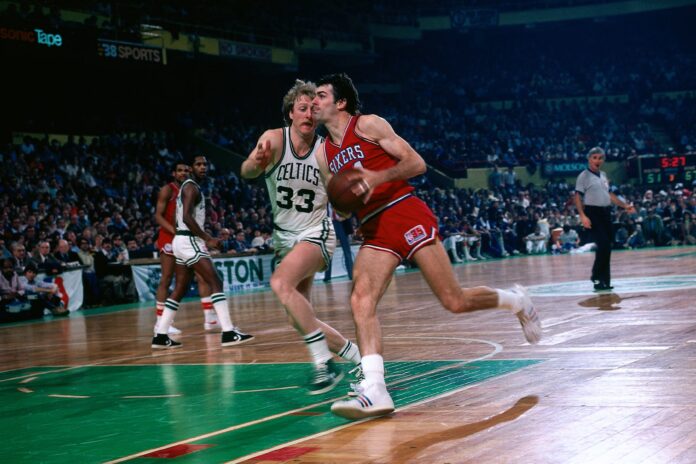
NBA.com
Years receiving Sixth Man of the Year votes: 2
Off the bench stats: 10.0 ppg, 4.5 rpg, 2.1 apg
One of the most underrated players of his era, Hall of Fame power forward Bobby Jones went from being a starter early in his career to mostly – outside of one season – coming off the bench in Philadelphia, where he found a ton of success, making two All-Star appearances (one as a full-time reserve) and winning one championship with the team in 1982-83.
Jones was a winning player, one who would lay his body out without a problem in order to pick up an extra possession or two for his team. He was also quite fast getting down the court and quick with his first step. Jones was also an outstanding defender, protecting the rim, jumping passing lanes and picking pockets. In the modern era, Jones would have been an Andrei Kirilenko type, a Swiss Army knife who could do a bit of everything on offense, though nothing at an elite level, and shine even more brightly on defense thanks to his versatility… except with more speed and quickness.
Despite not being a major scorer, various legends of his era thought extremely highly of Jones (via the New York Times in 1981):
”He’s dangerous at whatever he does,” said Red Auerbach, the president and general manager of the Celtics. Opponents will rarely find the 6-foot-9-inch Jones with the ball. Instead, he is in constant motion, much the way Bill Bradley of the Knicks was in his prime. ”Bobby can complement anybody’s game,” said Erving. ”I’m learning from him. So many of the things he does are difficult for the fans to understand or appreciate. His contributions can’t always be measured by what shows up in the stats. Just Bobby’s mere court presence is enough to beat you.”
Jones’ head coach at the time, Billy Cunningham, decided during the 1979 offseason that Jones should come off the bench for the betterment of the team, but worried about how to break the news to him. According to Cunningham, he sat down with Jones to tell him his decision, and it took 30 seconds for Jones to agree:
It did not take Jones, a slender man with dark eyes, long to get familiar with his new role. ”Since most of it is mental anyway, it only took me a couple of games to get used to coming off the bench,” said Jones. ”The only tough part was coming in cold. So, now I just try to jump right in and break a quick sweat. I try to be very aggressive, get a steal, block or a shot, do something dramatic. I have found that not starting has its advantages. It gives me a chance to analyze the flow and see what we need most when I get in there. ”There are other ways to help a team win without doing a lot of scoring. Besides the usual terms of defense, passing and rebounding, there are many helpful things that do not show in the stat sheets, like drawing a man over to you, so that your teammate gets free for the pass and shot.’
Jones being so willing to come off the bench helped make the Sixers of the late ‘70s and early ‘80s a juggernaut, as the team would go on to win 59, 62, 65 and 52 regular-season games over the next four seasons in which Jones was a reserve, including a dominant ‘83 campaign in which they won the NBA championship and lost just one game in the entire playoff run.















